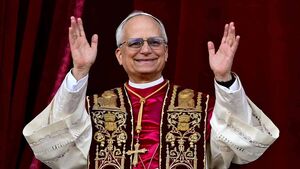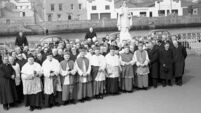Pope Leo spells out what pro-life truly means

While conservative Catholics may be disappointed that Pope Leo is not mirroring their views, it is absolutely clear now that his pastoral approach is in direct continuity with that of Pope Francis.
American Catholicism can be a strange bird. A core belief is that Catholicism dovetails nicely with the presumption that being rich is God’s blessing – with the unstated corollary that being poor is always your own fault. Thus, by casually flipping a core truth of Catholicism, the American rich are almost always sainted while the poor are ritually despised. Thus too character is a moveable feast with millions of Catholics voting for policies that run directly counter to the gospel truth.
Little wonder that American Catholicism can get skewed in its priorities and in its focus. Recently it’s pro-life stance had to be held up to the light by none other than the new pope, Leo XIV – himself an American – who knows a bit about Catholicism, both the real thing and its American version.
It happened like this. A US Senator, Richard Durbin, was given an award by the Archdiocese of Chicago for his work helping migrants. It generated some controversy because Durbin was known too for his support for abortion rights. A controversy ensued with ten bishops publicly calling on Cardinal Cupich of Chicago to rescind the award.
The nervous ground for American Catholics - including politicians like Joe Biden and others - of reconciling their own personal conviction of being against abortion while accepting that for others it is a civil right is ritually presented by bishops and Catholics generally as a fundamental denial of their Catholicism.
The problem, as Cardinal Cupich noted in his response, is that in the US today, Catholics who embrace the breadth of Church teaching are ‘politically homeless’. He explained: "The tragic reality in our nation today is that there are essentially no Catholic public officials who consistently pursue the essential elements of Catholic social teaching because our party system will not permit them to do so."
What Cupich objects to is that unless Catholic politicians are seen to reflect the essential elements of Catholic teaching in its entirety, they cannot be honoured even if they make a significant contribution (as Senator Durbin did) to a key part of that teaching. Cupich concluded: "Total condemnation is not the way forward, for it shuts down discussion. But praise and encouragement can open it up, by asking their recipients to consider how to extend their good work to other areas and issues. No one wants to engage with someone who treats them as a moral threat to the community."
Pope Leo was asked about the controversy and he voiced strong support for Cardinal Cupich’s position.
"I understand the difficulties and the tensions," he said, "but I think, as I myself have spoken in the past, it’s important to look at many issues that are related to what is the teaching of the church. Someone who says, I’m against abortion but I’m in favour of the death penalty, is not really pro-life. Someone who says, I’m against abortion, but I’m in favour of the inhuman treatment of immigrants in the United States, I don’t know if that’s pro-life."
The pope’s clarification is a clear refutation of the workable American definition of pro-life as opposition to abortion while at the same time defending the death penalty and opposing the rights of refugees and migrants. This clarification by the first ever American pope is a direct challenge to conservative Catholics – in America and elsewhere – to widen their definition and their understanding of what ‘pro-life’ actually means and, in particular not to limit it to just being anti-abortion.
When the late Pope Francis covered this ground before, conservative Catholics tended to dismiss his approach in opening up issues that were regarded as closed - like divorced and remarried Catholics receiving Communion, his welcome for gay Catholics including the blessing of gay marriages; and, not least, widening the definition of pro-life. His pontificate was easily dismissed as an aberration that would be righted as soon as his successor came along - a consummation for which (it seems) some Catholics were actually praying!
But now Pope Leo has indicated that, while he is different in many ways from his predecessor and has already made that plain for all to see, he will travel his own path and that includes following the trajectory that Francis mapped out for the Church. While conservative Catholics may be disappointed that Leo is not mirroring their views, it is absolutely clear now that his pastoral approach is in direct continuity with that of Pope Francis.
American Catholics, including American bishops and priests, will have to re-align their policies by rejecting the ‘culture warrior focus’ that has led to American Catholicism becoming identified with exclusion rather than inclusion, with defining their own version of Catholicism at odds with a much broader and fuller understanding of what Catholicism is.
The culture warrior approach of dismissing Catholics who didn’t measure up to a narrow definition of Catholicism as an unacceptably low water-mark for authentic Catholicism - as not ‘real Catholics’ - is now being unapologetically jettisoned. While Leo will be happy to make more room for conservative Catholics, unlike his more impatient predecessor, it is clear that he will no longer grant an indulgence to American (or other) Catholics who imagine that they can decide what ‘pro-life’ is or isn’t and even what Catholicism means.
To sum up, on the direction of Pope Leo XIV, it’s now crystal clear that whether we are American or Irish or anything else, that as Catholics we can’t hold two patently opposite positions at the same time - we can’t say that we are ‘pro-life’ if we are for the death penalty or hostile to immigrants.
Full stop.




